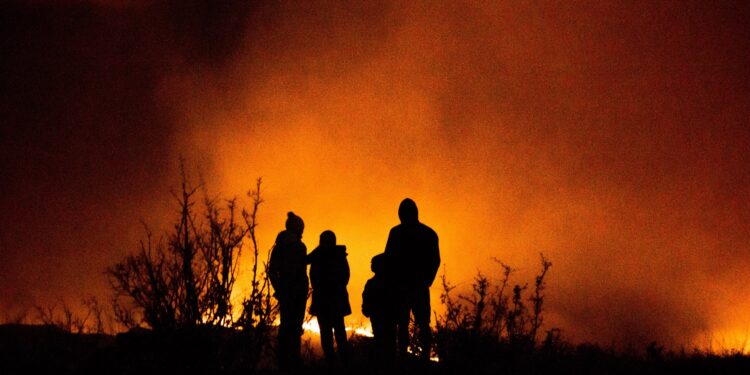Credit: Unsplash/CC0 Public domain
An Emory University study published Thursday in Natural mental health shows that wildfires are leading to increased anxiety-related emergency room visits in the western United States, amplifying the worrying parallel trajectory of two growing public health crises: mental health and climate change.
The study, led by researchers at Emory’s Rollins School of Public Health, is among the largest and most comprehensive research ever undertaken on the association between wildfire exposures and anxiety disorders.
By analyzing satellite data and nearly 1.9 million emergency room visits in five states (California, Arizona, Nevada, Oregon and Utah) from 2007 to 2018, researchers showed wildfire smoke events, c that is to say when forest fires become the main source of ambient pollution. in a zip code – were associated with a 6.3% increase in mental health-related emergency room visits.
In addition to these surprising data, the study shows:
- Women, girls, and older adults are more susceptible to severe anxiety disorders associated with wildfire exposure.
- Men and boys also experienced an increase in anxiety disorders, but only when linked to major smoke-related events.
- Evidence of improved disaster risk reduction and climate risk management strategies, including climate awareness and risk communication tailored to vulnerable populations.
What researchers say
“The scary thing about climate change is that it has no clear boundaries; there is a lot of fear of the unknown. We can now use the knowledge we have gained to tell people that it is There is no need to panic. When faced with a smoke alert wildfire, close your windows, limit your outdoor activities, and don’t panic. These kinds of preventative measures can potentially benefit the whole of the population,” says study co-author Yang Liu, Ph.D., chair and Gangarosa Distinguished Professor in the Gangarosa Department of Environmental Health at Rollins.
“Mental health is one of the most prevalent health issues in the United States and our study found multiple links between wildfires and an association with serious anxiety disorders. Many people are already experiencing symptoms mild or moderate mental health problems. Now imagine they wake up and “If you see the sky covered in smoke, they will probably feel even more anxious,” says the study’s lead author, Qingyang Zhu, Ph.D ., postdoctoral researcher at the Department of Environmental Health in Gangarosa.
Why is this important:
- Rising temperatures and changing drying patterns have significantly increased the risk of wildfires globally over the past 20 years, leading to larger areas burned and longer fire seasons.
- The Western United States is notoriously a fire-prone region, due to the recurrent presence of fire weather conditions, increasing droughts, and the abundance of fuel resources.
- Climate change has been linked to various psychological disorders such as anxiety, depression, post-traumatic stress disorder and eating disorders.
- Mental health disorders, including anxiety disorders, pose a growing threat to global public health over the past three decades. According to the most recent Global Burden of Disease study published in 2020, anxiety disorders were the 24th largest contributor – out of 369 diseases – to the global burden of disease.
More information:
Qingyang Zhu et al., Wildfires are associated with increased emergency room visits for anxiety disorders in the western United States, Natural mental health (2024). DOI: 10.1038/s44220-024-00210-8
Provided by Emory University
Quote: Wildfires linked to increase in mental health-related emergency room visits, study finds (February 16, 2024) retrieved February 16, 2024 from
This document is subject to copyright. Apart from fair use for private study or research purposes, no part may be reproduced without written permission. The content is provided for information only.



